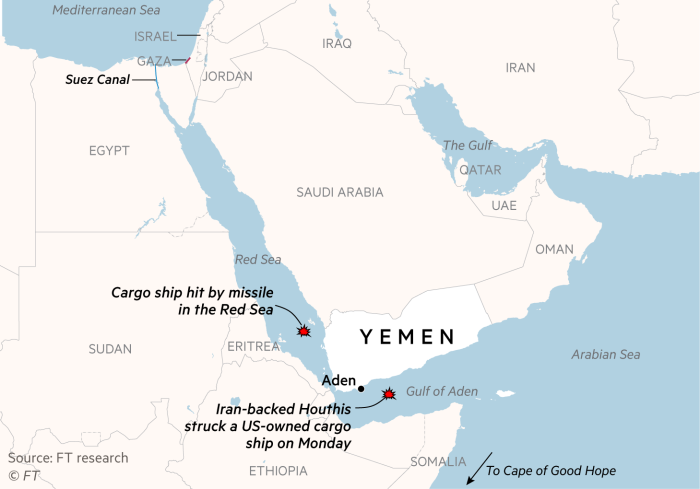
On Tuesday, US forces launched new strikes on targets linked to Houthi militants in Yemen, amid the disruption of global trade due to the diversion of cargo ships to avoid attacks by the Iranian-backed group in the Red Sea.
The US military's Central Command said its forces struck and destroyed four anti-ship ballistic missiles that the Houthis were preparing to launch from Yemen in the early hours of Tuesday. This was the third round of strikes by US forces on Houthi targets in Yemen in less than a week as the United States seeks to deter rebel attacks on shipping in the vital waterway.
However, the Houthis succeeded hours later in launching a missile that hit Al-Zaghrafiyya, a Greek-owned, Maltese-flagged ship transporting dry bulk cargo, which was sailing towards the Suez Canal. This came after a missile attack on Monday on another cargo tanker in the Gulf of Aden.
Recent Houthi strikes have prompted more ship classes to avoid the main shipping route through the Red Sea, instead making the longer voyage between Asia and Europe via the Cape of Good Hope and delaying deliveries to companies.
Automotive groups have been particularly affected by ship delays, which have so far mainly affected container ships carrying manufactured goods and semi-finished components.
Volvo Cars said on Tuesday it had halted production at its factory in Belgium after a shipping disruption delayed deliveries of gearboxes, while tire maker Michelin said a delay in the Red Sea would lead to an “accidental stoppage” at its European plants in January.
Figures from London-based shipping services firm Clarksons suggest that more classes of ships are starting to divert: between 13 and 15 January, dry bulk tanker arrivals to the Gulf of Aden, via the Red Sea, fell by 25 per cent. From the first half of December. Until last week, the arrival of these ships had been little affected.
This decline threatens delays and additional costs for industries including the food and metals industries that receive shipments of many commodities transported in dry bulk carriers.

The US action on Tuesday followed an initial wave of strikes by British and US forces on more than 60 Houthi targets in Yemen on Thursday and Friday night, which the two countries said were aimed at deterring the Houthis and stopping disruption to shipping.
The Houthis vowed to respond forcefully to the military action against them and to continue targeting ships. They insist that their campaign is a response to the Israeli attack on Hamas, the Palestinian armed movement, in Gaza.
The Houthis fired their final missile at around 1.45pm local time on “international shipping lanes” in the southern Red Sea, according to US Central Command. The statement said that the ship “Zogravia”, which was empty of cargo at the time of the attack, was “damaged but seaworthy” and continued its voyage, without any injuries reported.
US forces also said on Tuesday that the Iranian Navy seized components of Iranian-made ballistic missiles and cruise missiles on January 11 from a ship that was headed to “resupply Houthi forces in Yemen.” They added that two naval soldiers were lost at sea during the operation, and the search for them is still continuing.
Recent Houthi attacks raise the possibility that bulk ship owners may shift en masse away from the Red Sea route, as companies operating container ships have already done. Container ship arrivals have fallen by 90 per cent since early December, according to Clarksons.
Large ship operator, Japan's NYK Line, said on Tuesday it had “temporarily suspended” navigation in the Red Sea for all its vessels, which include dry bulk vessels, tankers, LNG carriers and roll-offs. – Outside the ships.
“For ships sailing near the Red Sea, NYK has issued instructions to wait in safe waters and is considering changing course,” the company said.
Other natural gas tanker operators are also changing their routes. Niels Christian Ström, managing director of Knutsen LNG, which operates six tankers for Shell, confirmed that the company's operating vessels had been diverted to the longer route.
Three other natural gas tankers operating for Qatar's state-owned Qatar Energy Company – which were scheduled to enter the Red Sea to sail to Europe – have switched to different routes, according to ship-tracking data from information service Kpler.
Qatari Prime Minister Sheikh Mohammed bin Abdulrahman Al Thani said on Tuesday that the escalating attacks in the Red Sea have changed “how we look at international trade, how we look at international shipping, and how interconnected we are from east to west.”
In his speech at the World Economic Forum in Davos, Sheikh Mohammed said: “I believe that if we want to address this issue, we need to address the real issue, the central issue, which is [the war in] Gaza, in order to defuse everything else.”
Also in Davos, US National Security Advisor Jake Sullivan said that his country expected the Houthis to continue threatening the United States after its first strikes. He added that more countries will have to confront the group.
“[This] goes down . . . “For a wide range of countries, including those with influence in Tehran and influence in other capitals in the Middle East, making this a priority.”
He added that such steps indicate that “the entire world” rejects the idea that a group like the Houthis can “hijack the world” as they do.
Additional reporting by Peter Campbell in London and Sarah White in Paris

“Web maven. Infuriatingly humble beer geek. Bacon fanatic. Typical creator. Music expert.”






More Stories
Dow Jones Futures: Microsoft, MetaEngs Outperform; Robinhood Dives, Cryptocurrency Plays Slip
Strategist explains why investors should buy Mag 7 ‘now’
Everyone gave Reddit an upvote